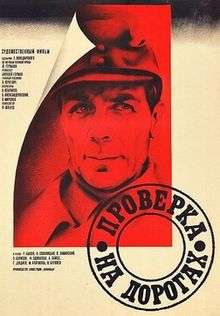Trial on the Road
| Trial on the Road | |
|---|---|
 | |
| Directed by | Aleksey German |
| Written by | Yuri German. |
| Screenplay by | Eduard Volodarsky |
| Starring |
Rolan Bykov Anatoly Solonitsyn Vladimir Zamansky |
| Distributed by | Lenfilm |
Release dates |
|
Running time | 96 min |
| Country | Soviet Union |
| Language | Russian |
Trial on the Road (Russian: Проверка на дорогах, translit. Proverka na Dorogakh) is a 1971 Soviet film set in World War II, directed by Aleksey German, starring Rolan Bykov, Anatoly Solonitsyn and Vladimir Zamansky.[1][2] It is also known as Checkpoint or Check up on the Road.[3]
Trial on the Road was censored and taken out of circulation in the Soviet Union for 15 years after its release due to its controversial depiction of Soviet soldiers. The film is based on a story by the director's father, Yuri German.[4] The screenplay was written by Eduard Volodarsky.[5]
Plot
This film is Alexei German's solo directorial debut which took a philosophical approach to the Soviet usage of "heroes" and "traitors". Screenplay by A. German and Eduard Y. Volodarsky (1941-2012), the film is based on the novel of his father (Operatsiya "S Novym Godom", or Operation "Happy New Year"), Yuri German (1910-1967), a famous Soviet novelist, screenwriter, and journalist. It was shot brilliantly in black-and-white by a crew of cinematographers (B. Aleksandrovsky and Lev Kolganov), Director of Photography (Yasha Sklansky[6]), and Production Designer (Valery Yurkevich).
The drama takes place in December 1942 during the Nazi occupation of the USSR in World War II. It revolves around the former Red Army sergeant Lazarov (played by Vladimir Zamansky) who was captured in his German uniform by Soviet partisans. He had defected to the Nazis to fight for the German Army but has now switched sides again and agreed to join a group of partisans and fight against the Nazis. Typically, traitors were shot by the Soviets or sent as prisoners to Siberia (Gulag), but in this film, two leaders of the resistance fighters, Commander Lokotkov (played by Rolan Bykov, actor's best performance) and Commissar Petushkov (played by Anatoly Solonitsyn), regard the defector differently and decided to put his loyalty to the test.[4] For some partisans, he will be always a traitor and treated with suspicion, but for others this former Red Army officer, by joining the group of partisans, has to prove himself on the battlefield as a patriot and hero. In the end he distinguishes himself by bravery and heroism.
Release history
The "Trial on the Road" film was shot in 1971, but was banned for 15 years. It was "shelved" presumably for the film's theme, sympathy to a traitor, or collaborator with Nazi forces, but who becomes a hero in fighting against the Germans on the Soviets side. This "anti-heroic" depiction of Soviet history shows that distinctions like "traitor" and "hero" cease to have a any real meaning, according to Alexei German's humane portrait of wartime. The film was released in 1987, during "perestroika" in the Soviet Union.[7]
References
- ↑ "TRIAL ON THE ROAD". Gene Siskel Film Center - School of the Art Institute of Chicago. Retrieved 28 February 2013.
- ↑ "Trial on the Road". Lincoln Center Film Society. Retrieved 28 February 2013.
- ↑ IMDb
- 1 2 "Trial on the Road (Proverka na Dorogakh)". Seattle International Film Festival 2012. Retrieved 28 February 2013.
- ↑ Roth, Andrew (2012-10-13). "Eduard Volodarsky, Screenwriter Banned by Soviets, Dies at 71". New York Times. Retrieved 2013-03-22.
- ↑ VOLAND, JOHN (1986-11-15). "Soviet Emigre Hopes His Film Trials Are Over". Los Angeles Times. ISSN 0458-3035. Retrieved 2016-02-11.
- ↑ Youngblood 2007, p. 177.
External links
- Trial on the Road is available for free download at the Internet Archive
- Trial on the Road at the Internet Movie Database